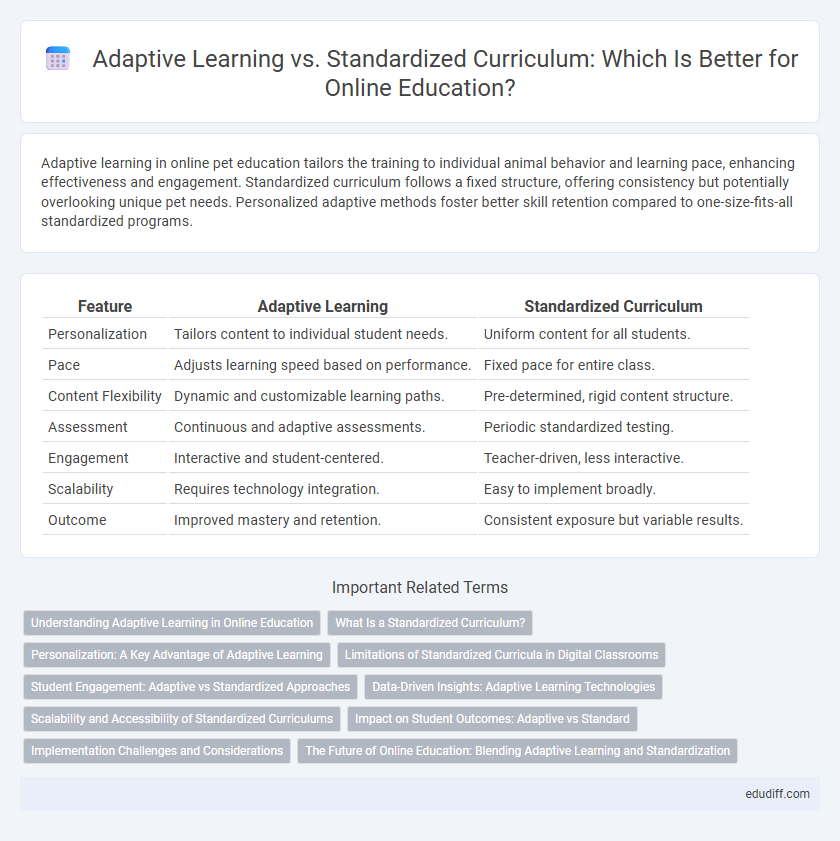Adaptive learning in online pet education tailors the training to individual animal behavior and learning pace, enhancing effectiveness and engagement. Standardized curriculum follows a fixed structure, offering consistency but potentially overlooking unique pet needs. Personalized adaptive methods foster better skill retention compared to one-size-fits-all standardized programs.
Table of Comparison
| Feature | Adaptive Learning | Standardized Curriculum |
|---|---|---|
| Personalization | Tailors content to individual student needs. | Uniform content for all students. |
| Pace | Adjusts learning speed based on performance. | Fixed pace for entire class. |
| Content Flexibility | Dynamic and customizable learning paths. | Pre-determined, rigid content structure. |
| Assessment | Continuous and adaptive assessments. | Periodic standardized testing. |
| Engagement | Interactive and student-centered. | Teacher-driven, less interactive. |
| Scalability | Requires technology integration. | Easy to implement broadly. |
| Outcome | Improved mastery and retention. | Consistent exposure but variable results. |
Understanding Adaptive Learning in Online Education
Adaptive learning in online education uses algorithms and data analytics to tailor instructional content to individual student needs, enhancing engagement and retention. Unlike standardized curricula, which deliver uniform content regardless of learner differences, adaptive systems continuously adjust pacing and difficulty based on real-time performance metrics. This personalized approach improves learning outcomes by addressing diverse cognitive abilities and learning styles in a dynamic digital environment.
What Is a Standardized Curriculum?
A standardized curriculum consists of a fixed set of learning objectives, materials, and assessments designed to be delivered uniformly across all students. It emphasizes consistency and equal exposure to core content, ensuring that every learner meets predetermined academic standards. This approach contrasts with adaptive learning, which customizes education based on individual student needs and progress.
Personalization: A Key Advantage of Adaptive Learning
Adaptive learning leverages real-time data and algorithms to tailor educational content to individual students' strengths, weaknesses, and learning pace, markedly enhancing personalization compared to standardized curriculums. This approach boosts engagement and retention by delivering customized resources and assessments that evolve with the learner's progress. In contrast, standardized curriculums often present uniform content that fails to address diverse learning needs, limiting personalization and student growth.
Limitations of Standardized Curricula in Digital Classrooms
Standardized curricula in digital classrooms often fail to address diverse learning styles and paces, resulting in disengagement and uneven knowledge retention among students. The rigid structure limits personalized feedback and adaptive resources that online platforms can offer to enhance comprehension. Consequently, these constraints hinder the potential for tailored educational experiences essential for maximizing student success in virtual environments.
Student Engagement: Adaptive vs Standardized Approaches
Adaptive learning systems personalize content based on individual student performance, significantly increasing engagement by addressing unique learning needs and pacing. Standardized curriculums often fail to capture diverse learner interests, leading to decreased motivation and participation. Higher student engagement in adaptive learning correlates with improved retention and academic outcomes.
Data-Driven Insights: Adaptive Learning Technologies
Adaptive learning technologies leverage data-driven insights to customize educational content based on individual learner performance, engagement, and preferences, significantly enhancing personalized learning outcomes. Standardized curriculums often lack this dynamic adjustment capability, resulting in a one-size-fits-all approach that may not address diverse learner needs effectively. By continuously analyzing real-time data, adaptive systems optimize instructional strategies, improving retention rates and overall student achievement in online learning environments.
Scalability and Accessibility of Standardized Curriculums
Standardized curriculums offer high scalability by providing uniform content that can be easily distributed across multiple online platforms, ensuring consistent educational quality worldwide. Their accessibility is enhanced through digital formats compatible with various devices, enabling learners in remote or underserved regions to access standardized educational resources without barriers. However, while scalable, standardized curriculums may lack the personalized adjustments that adaptive learning systems provide for individual student needs.
Impact on Student Outcomes: Adaptive vs Standard
Adaptive learning systems leverage real-time data and personalized content to address individual student needs, significantly improving engagement and retention rates compared to standardized curriculums. Studies indicate that students using adaptive learning platforms demonstrate higher test scores and deeper understanding due to tailored pacing and targeted interventions. Standardized curriculums often fail to accommodate diverse learning styles, resulting in lower overall achievement and increased dropout rates.
Implementation Challenges and Considerations
Implementation challenges in adaptive learning include the need for robust data analytics, sophisticated software infrastructure, and continuous content updates to personalize student experiences effectively. Standardized curriculum faces obstacles such as inflexibility in meeting diverse learner needs and difficulties in incorporating real-time feedback for curriculum adjustments. Both approaches require significant teacher training, technological investment, and alignment with educational standards to ensure successful integration.
The Future of Online Education: Blending Adaptive Learning and Standardization
Adaptive learning technologies personalize online education by utilizing real-time data analytics to tailor content to individual student needs, improving engagement and outcomes. Standardized curricula ensure consistent learning objectives and quality benchmarks across diverse educational settings, providing a reliable framework for assessment and accreditation. The future of online education lies in integrating adaptive learning algorithms within standardized curricula, enabling scalable, personalized instruction that meets both individual learner paths and universal educational standards.
Adaptive learning vs Standardized curriculum Infographic

 edudiff.com
edudiff.com